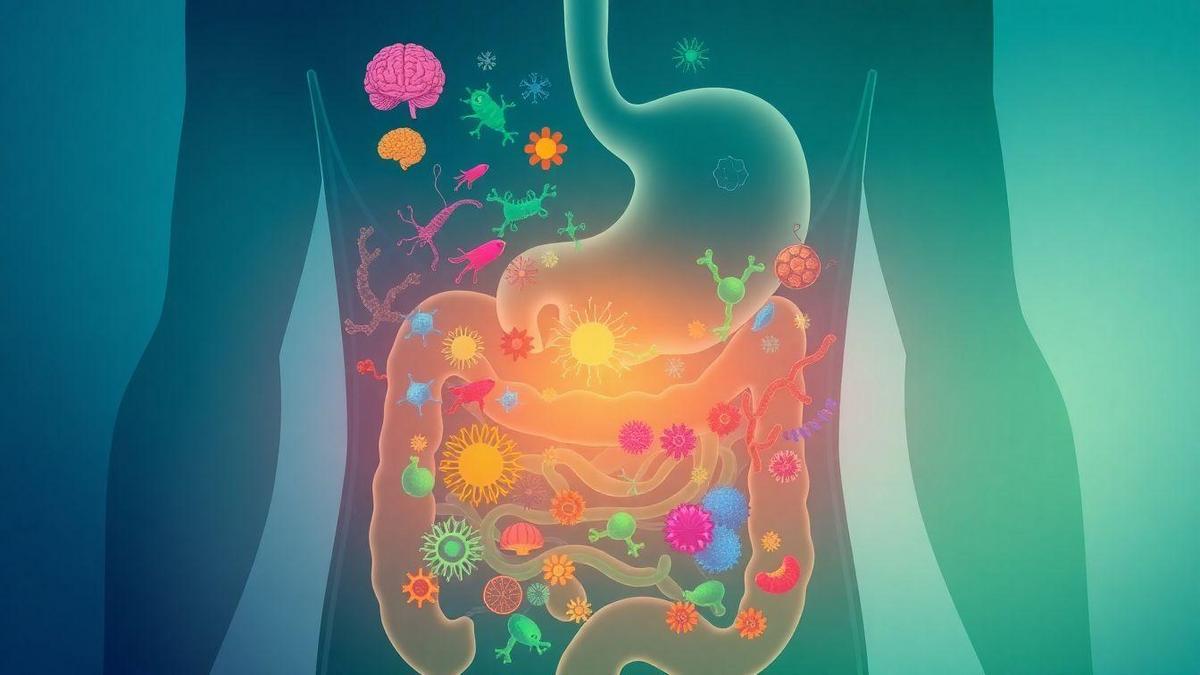Anúncios
A microbiota intestinal é uma comunidade de microrganismos que desempenha funções essenciais no organismo humano. Além do impacto na digestão e imunidade, ela influencia diretamente o bem-estar mental. Sua atuação se dá por meio do eixo intestino-cérebro e da produção de substâncias neuroativas.
Pesquisas recentes revelam uma conexão profunda entre saúde intestinal e transtornos mentais. Alterações no microbioma podem afetar o humor, a ansiedade e o comportamento. Assim, cuidar da microbiota intestinal tornou-se fundamental para a saúde mental.
Anúncios

How Does the Gut Microbiota Influence Mental Health?
The gut microbiota plays a crucial role in our overall health, influencing not only our physical well-being but also our mental health. This complex community of microorganisms, including bacteria, viruses, fungi, and other microbes, resides in our digestive tract and participates in various physiological processes. Research shows that the gut microbiota can impact brain function and behavior through various mechanisms, including the production of neurotransmitters, modulation of the immune system, and communication with the central nervous system via the gut-brain axis.
One of the most significant ways in which the gut microbiota influences mental health is through the production of neurotransmitters such as serotonin, dopamine, and gamma-aminobutyric acid (GABA). These chemical messengers are essential for regulating mood, anxiety, and overall emotional well-being. It is estimated that about 90% of the body’s serotonin is produced in the gut. An imbalance in gut bacteria can lead to changes in neurotransmitter levels, contributing to the development of mental disorders such as depression and anxiety.
Moreover, the gut microbiota interacts with the immune system, influencing inflammation levels in the body. Chronic inflammation is linked to various mental health conditions, including depression and schizophrenia. The gut microbiota can modulate the immune response by producing short-chain fatty acids (SCFAs) during the fermentation of dietary fibers. These SCFAs have anti-inflammatory properties and can help maintain a healthy balance in the gut, potentially reducing the risk of developing mental health issues.
Additionally, communication between the gut and the brain, known as the gut-brain axis, is a vital pathway through which the gut microbiota affects mental health. This bidirectional communication involves various signaling pathways, including the vagus nerve, hormones, and immune mediators. Disruptions in this communication can lead to changes in mood and behavior, highlighting the importance of maintaining a healthy gut microbiome for optimal mental health.
The gut-brain axis is a communication pathway between the digestive tract and the central nervous system. It allows the microbiota to directly influence brain functions. This process occurs through hormonal, immune, and neural pathways, such as the vagus nerve.
Gut bacteria produce compounds that affect brain neurotransmitters. This can interfere with the regulation of mood and emotions. Therefore, gut imbalances are linked to disorders such as depression.
The integrity of this axis is vital for emotional stability. When dysfunctions occur, the body may respond with inflammation and chronic stress. This worsens mental symptoms and harms overall well-being.
Maintaining a healthy microbiota helps strengthen this communication system. A balanced diet and stress control are effective measures. These practices preserve the axis and promote mental health.
Neurotransmitters Produced by the Gut Microbiota

The gut microbiota is involved in the synthesis of important neurotransmitters. Substances like serotonin, dopamine, and GABA are partially produced in the gut. They play essential roles in emotion regulation.
About 90% of the body’s serotonin is generated in the intestinal tract. This neurotransmitter is directly linked to mood and the sense of well-being. An imbalance may promote depressive and anxious states.
Dopamine, related to motivation and pleasure, is also influenced by the microbiota. The lack of this compound may contribute to symptoms of apathy. The same goes for GABA, which has a calming effect on the nervous system.
Therefore, taking care of the microbiota is essential to keeping these neurotransmitters in balance. Consuming foods rich in fiber and probiotics may help. These practices strengthen the natural production of these substances.
Advantages of Understanding the Connection Between Gut Microbiota and Mental Health
Understanding the connection between the gut microbiota and mental health offers numerous advantages for individuals seeking to improve their overall well-being. One of the main benefits is the potential to develop new therapeutic approaches for mental disorders. Traditional treatments for conditions such as depression and anxiety often involve pharmacological interventions, which may have side effects and varying degrees of effectiveness. By exploring the role of the gut microbiota, researchers are discovering innovative strategies that can complement or even replace conventional treatments.
Another advantage of this understanding is the emphasis on preventive measures. Recognizing the importance of gut health in mental well-being, individuals can take proactive steps to maintain a balanced microbiome. This includes dietary changes, lifestyle modifications, and stress management techniques that can improve gut health and, consequently, mental health. These preventive strategies can empower individuals to take control of their well-being and reduce the risk of developing mental health issues.
Furthermore, understanding the gut-brain connection can promote a more holistic approach to mental health care. It encourages professionals and patients to consider the interaction between physical and mental health, fostering a comprehensive understanding of well-being. This perspective can lead to more effective treatment plans that address both the psychological and physiological aspects of mental health, ultimately improving patient outcomes.
Finally, increased awareness of the role of the gut microbiota in mental health can lead to greater public interest and research funding in this area. As more studies are conducted, the scientific community can continue to uncover the intricate relationships between gut health and mental well-being, paving the way for new discoveries and advancements in mental health care.
How to Improve Mental Well-Being Through Gut Health

Improving mental well-being through gut health is an empowering approach that individuals can adopt to enhance their quality of life. Here are some effective strategies to consider:
Incorporate Probiotics into Your Diet: Probiotics are beneficial bacteria that can help restore the balance of the gut microbiota. Including probiotic-rich foods such as yogurt, kefir, sauerkraut, and kimchi in your diet can support gut health and potentially improve mood and mental well-being.
Increase Microbiome Diversity with Whole Foods: A diverse gut microbiome is associated with better health outcomes. Consuming a variety of whole foods, including fruits, vegetables, whole grains, and legumes, can provide essential nutrients and fibers that promote microbiome diversity, positively impacting mental health.
Manage Stress to Support Gut Health: Chronic stress can disrupt the gut microbiota and contribute to mental health issues. Implementing stress management techniques such as mindfulness, meditation, yoga, or deep breathing exercises can help lower stress levels and support a healthy gut.
Stay Hydrated for Optimal Gut Function: Proper hydration is essential for maintaining gut health. Drinking enough water throughout the day supports digestion, nutrient absorption, and waste elimination, contributing to a balanced gut microbiome and improved mental well-being.
Limit Processed Foods to Maintain Gut Flora: Processed foods often contain additives, preservatives, and unhealthy fats that can negatively affect gut health. Reducing the intake of these foods and focusing on whole, nutrient-dense options can help maintain healthy gut flora, promoting better mental health.
Consider Psychobiotics for Mental Health Support: Psychobiotics are a class of probiotics that have shown a positive effect on mental health. These beneficial bacteria may help reduce symptoms of anxiety and depression. Consulting a healthcare professional can help determine whether psychobiotics are a suitable option for your mental health needs.
By implementing these strategies, individuals can take proactive steps toward improving their mental well-being through gut health. A healthy gut microbiome can positively influence mood, reduce anxiety, and enhance overall emotional resilience.
Did You Enjoy Learning About the Discovery of the Gut Microbiota and Mental Health Connection?
The discovery of the connection between the gut microbiota and mental health is a fascinating and rapidly evolving field of research. Understanding how the gut influences our mental state opens new avenues for improving mental well-being and addressing mental health disorders. By prioritizing gut health, individuals can take meaningful steps toward enhancing their emotional resilience and quality of life.
As we continue to explore this intricate relationship, it becomes increasingly clear that maintaining a healthy gut microbiome is essential for both physical and mental health. The more we learn about the gut-brain connection, the better prepared we are to make informed choices that support our well-being.
Frequently Asked Questions
What is the connection between the gut microbiota and mental health?
The discovery of the connection between the gut microbiota and mental health shows that the microorganisms in your gut can affect your mood and behavior.
How does the gut microbiota influence my mood?
These microorganisms produce substances that affect neurotransmitters, such as serotonin, which regulates your mood.
What are the effects of diet on the gut microbiota?
Your diet can change the composition of your microbiota. Eating fruits, vegetables, and fiber helps keep it healthy, thereby influencing your mental health.
Is there a link between probiotics and mental health?
Yes! Research suggests that probiotics can help improve mental health by balancing the gut microbiota.
How can I take care of my gut microbiota?
You can take care of your microbiota with a balanced diet, avoiding processed foods and stress.
Se precisar da versão em outro formato ou quiser ajustar o vocabulário para um público específico (científico, leigo, acadêmico), posso ajudar com isso também.
